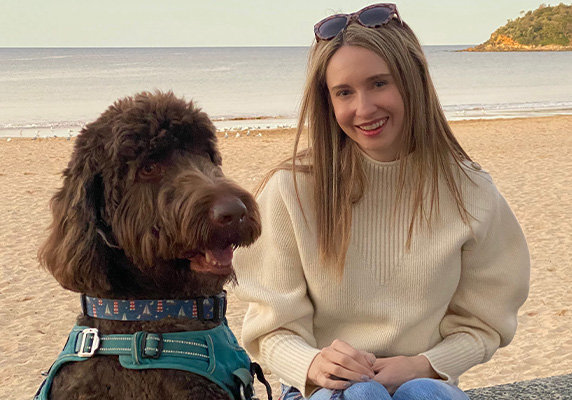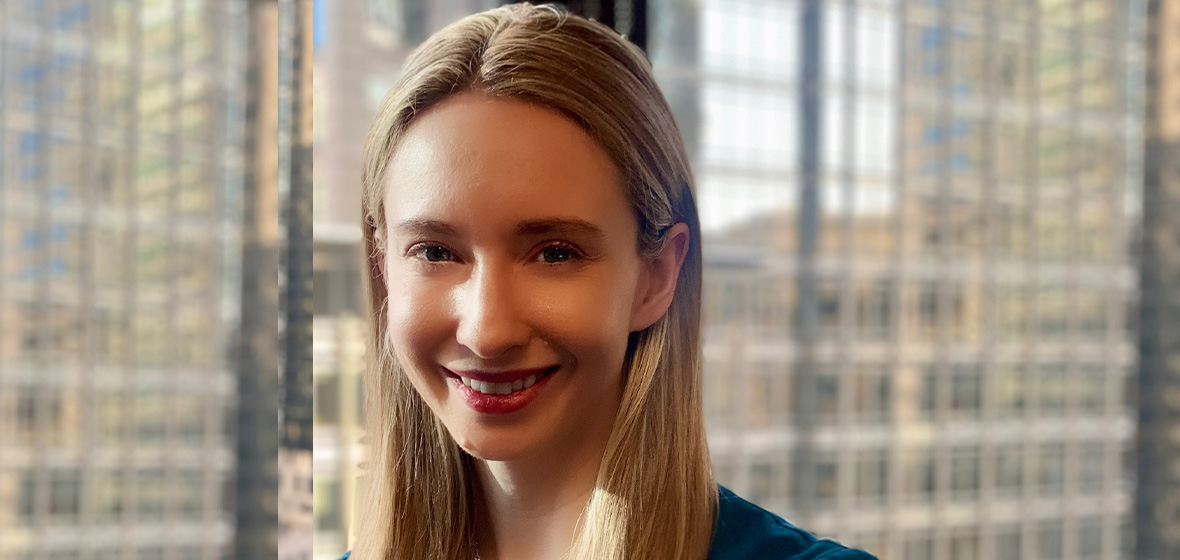Cate Cloudsdale has always been highly curious.
Even as a child, she says, “I loved consuming knowledge and considering different perspectives. At school, if there was choice between sport and a book I would choose to sit on a bench while all the other kids ran around the oval.”
“At high school,” she continues, “that curiosity translated into an interest in argument and in rationalities. I really enjoyed debating.
“Then at university” – Cloudsdale studied law at the University of New England in Armidale – “I studied advanced logic, and that cemented this idea of consuming as much knowledge as possible, being able to translate it into arguments and being able to dissect another person’s argument.”
This marvellous process
“I’ve embraced where my career has taken me,” Cloudsdale says.
In her first legal role, she soon realised law was the correct choice for her. “I had my start in the Federal Circuit Court after graduation, as a judge’s associate, and what I saw there was administrative law in practice. At university, while I’d read the cases, I didn’t properly understand what it meant for a person to have a fair hearing, a fair go, until I had a human being in front of me with a decision being examined – a decision where there was evidence of bias – and this person was clearly aggrieved.
“It made me think how I would feel if I was in that position,” she adds, “and, watching the judge and the way he dealt with that person, it sank into me that this is exactly why I wanted to be a lawyer.
“Some of the things I learnt from this judge,” she explains, “aside from technical legal skills, was integrity and manners. At the end of every hearing, he would thank the participants and in particular he would call out the valuable contribution of the court interpreter; he expressed genuine gratitude. I walked away with a real sense that everyone has a role to play in giving a person a fair hearing. And I’m a participant in this marvellous process that contributes so much to the legally sound world that we live in.”
‘ I walked away with a real sense that everyone has a role to play in giving a person a fair hearing.’
After her Federal Circuit Court role, Cloudsdale worked for five years in Canberra with the Department of Immigration – now Home Affairs: “I did things like AAT hearings for visa cancellations on character grounds – a unique experience for a young lawyer to learn some advocacy skills.”
Then, wanting to return to Sydney, she found a position with the Department of Communications and the Arts. “Until that point I hadn’t dealt with the intersection of technology with the law, but I remember being given a set of network diagrams and being asked to explain them in a meeting. Nothing creates neuroplasticity faster than being forced to expand your mindset like that.”
To expand and expand and expand
After three years, where, she says, “a brilliant general counsel taught me a great deal,” she searched for more learning opportunities, finding a role at the Office of the Australian Information Commissioner (OAIC).
In her new workplace, Cloudsdale says, she took up the chance to acquire yet another skill.
She started working in the legal services area, and then was given “a wonderful opportunity to design a team that handles privacy determinations. These are statutory decisions under the Privacy Act 1988 (Cth) about whether entities have breached the Act.”
“Being given this privilege, I felt like the OAIC leaders trusted me to use my administrative law skills and helped me to become a privacy specialist with subject matter expertise.
“Then, towards the end of 2022, there was a significant increase in data breaches that impacted a larger number of Australians,” she continues. “I had the opportunity to step into a project management role to help with the response to this issue. I have since taken a role in the OAIC’s Major Investigations Branch.
“When the cyber incidents emerged,” Cloudsdale adds, “I realised I needed to get myself into the cyber mindset, so I’ve enrolled in a diploma of ICT and Cybersecurity through TAFE, to augment my understanding of complementary issues.
“I think constantly pivoting and acquiring more information is what makes you a better lawyer. To be able to expand and expand and expand.”
‘I think constantly pivoting and acquiring more information is what makes you a better lawyer.’
Cloudsdale is delighted and stimulated by her work with the OAIC. “I couldn’t have been happier actually,” she says with her customary enthusiasm.
“It’s a very supportive environment, a unique working environment,” she adds. “There’s a variety of work – notifiable data breaches, complaints, litigation, policy. The OAIC has privacy and FOI functions. In our privacy function, we regulate Australian government agencies, organisations with turnover more than $3M and other types of organisations.
“There are investigative and enforcement roles, an educative function, and a guidance function to deliver to entities governed by the Privacy Act and to assist them to meet their responsibilities. There is also a monitoring role: ensuring that outcomes are followed up, and that regulatory action has its intended effect.”
Cloudsdale outlines the structure of the OAIC: “There are five branches – Major Investigations, Regulatory & Strategy, Corporate, Dispute Resolution and Freedom of Information. Major Investigations is a new branch, established to deal with particularly serious alleged breaches of the Privacy Act.
“As announced in May, there is going to be a return to the three-Commissioner model, meaning that there are three statutory office holders – the Australian Information Commissioner, Privacy Commissioner and FOI Commissioner.”
“In my own area, the team is led by an Assistant Commissioner, who has great energy and commitment to bringing people together, and there are three directors in the branch, myself and two others. We investigate large-scale breaches, affecting large numbers of individuals.
How the puzzle fits together
Cloudsdale marvels as she recalls the variety in her legal career to date.
“I’ve been in a number of government agencies: a court, a regulator, departments with operational focus and policy functions. I’ve done litigation, advising, advocacy, administrative decision making, Working in government, I’m grateful to have had such a variety of experience. Given that variety, perhaps the constant thread is those skills that you pick up upon the way: how to speak to people, how to negotiate, how to give Plain English advice – those are the things you keep carrying forward and trying to perfect.”
“I thought being a lawyer would be more about the technical skills of practising the law,” Cloudsdale continues, “and what surprised me was how much I had to learn in terms of soft skills, communication and managing teams, how to coach and mentor others, organisational leadership and strategic thinking, and being able to make sure that the machinery is working.
“I was surprised as well at the incremental steps taken by a lawyer, simple things, such as organising witnesses. If you broke these tasks down into their components, none of these things are difficult in and of themselves, but how you make sure the puzzle fits together, that’s the real skill.”

“I consider myself an administrative lawyer,” Cloudsdale says, “but in recent times I feel like that is expanding to have a focus on data protection, cyber and technology.”
Open to anything
Being a member of the Law Society of NSW’s Government Solicitors Committee, Cloudsdale says, is another way to expand her legal knowledge. “It’s all about seeing how people think and learning from them.” She is keen to assist in other ways as well. “I’m open to anything, that’s my policy.”
Cloudsdale’s openness to learning more about the community is evident in the volunteering role she has taken on: “I volunteer regularly for a charity called Family Drug Support as a phone support counsellor. This work is targeted at the families of people who have substance abuse disorders. The stories the people have to tell are so profound and powerful, it’s a good exercise in connecting with people that I wouldn’t otherwise connect with.”
“When I’m listening as a lawyer,” she explains, “I’m listening for facts and figures and to give advice and strategy. When I hear these people’s stories, however, it’s a different skill: I’m listening to understand emotion and to demonstrate human connection. Often there are unfair situations and there’s no way to make it fair; all you can do is listen.
“My volunteering role is not one of legal advisor – it’s purely a support role, which is so refreshing. It exposes me to different people, different characters. People tell you everything, how their loved one got into drugs or alcohol abuse, the systems they’ve gone through, the crimes they’ve ended up in. More than anything, it’s given me a grasp of human nature and human resilience.”
Cloudsdale adds thoughtfully, “A lot of professionals call the support line as well, and it does make me think that substance abuse probably affects a broader cohort of society than we realise. There are people suiting up, getting to their desks, going through the job of being that wonderful staffer, going home and being wonderful parents, and also dealing with family issues in the background. It makes me cognisant of what people might be going through all around us. I think it makes me more mindful of the society in which I live.”
Shakespeare’s advice
How does this warm, empathetic woman take care of herself? Cloudsdale says, “I’ve got my dog Shakespeare: he tells me when it’s time to get away from the computer. It’s almost like he can sense that I need to stop working and go out into nature. And I’m really enjoying the articles the Law Society is publishing on how to relieve stress, how to give yourself a licence to recognise that.”
Family connection contributes to her equilibrium and sense of purpose.
“My sister is one of my greatest inspirations. She’s always been so supportive of me. She started working as a court officer and then she went to work at Legal Aid. She had a great passion for the work she did there. Ultimately, she was appointed as a magistrate, and that’s an incredible story of watching someone go from the start of her legal career, right to where she wants to be, and not straying from belief in herself.




